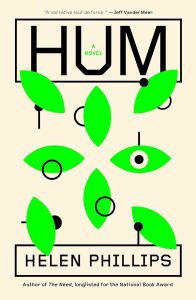Hum by Helen Phillips: Review by Ian Mond
 Hum, Helen Phillips (Marysue Rucci Books 978-1-66800-883-6, $27.99, 272pp, hc) August 2024.
Hum, Helen Phillips (Marysue Rucci Books 978-1-66800-883-6, $27.99, 272pp, hc) August 2024.
The novels I review for this column are not chosen with a theme in mind. If one does pop up, it’s purely coincidental. That goes for this month. I had no idea Hum, Napalm in the Heart, and Ultra 85 would all be dystopian novels. The good news is that they’re very different in tone, approach, and subject matter, evidence that no matter how narrow the subgenre, a talented author will find the space to produce something fresh and innovative.
Let’s begin with Helen Phillips’s much-anticipated new novel, Hum. I first encountered Phillips’s work in 2019 with her National Book Award-nominated novel The Need. It’s an unnerving thriller that starts as a home invasion – it’s late at night, and a mother, alone with her two young children, knows someone is with them in the house – only to take a surprising, speculative turn. (I won’t spoil the twist other than to say it caught me off guard.) The Need marked Phillips as a writer to watch, and, as such, I was eager to read (and review) Hum. Much like The Need, motherhood is central to the novel, exploring the fear and dislocation of raising children in a world made unstable by climate change and artificial intelligence.
When we meet May Webb, she’s undergoing a procedure that will subtly change her face so cameras can’t recognise her. No, May isn’t a superspy about to embark on a treacherous mission; she’s an unemployed white-collar worker willing to undergo an experimental process for ten months’ worth of salary. When she did work, May “was one of the many hired to help refine and deepen the communicative abilities of artificial intelligence.” But, in a cruel twist of irony, those same large language models now power hums (sans capital “H”), automatons that have “rendered [May] obsolete”. She hopes that the money and her husband Jem’s gig work (he kills rats and spiders for rich people) will tide them over until she finds another job. Then, the family could:
Keep the apartment. Have insurance again, or at least be able to pay out of pocket for Lu’s dental care and the relentless cavities, and take Sy back to the specialist to help with his fine motor skills. Buy groceries. Buy the things the kids kept needing.
In the meantime, May will pay the rent, purchase much-needed supplies and, maybe, splurge a little, just like she, Jem and the kids used to when they were a typical middle-class family before the hums took all the jobs and global warming turned the city into a furnace. May is thinking of the Botanical Garden, that walled oasis in the middle of the city where, for an exorbitant price, you can walk amongst the flora and fauna, bubbling brooks and scampering rabbits. But even Paradise can’t keep the anxieties and pressures of a claustrophobic and broken world at bay.
It’s still rare to encounter a dystopian narrative in which you can connect our present with the future depicted by the author. (I can think of two recent examples: Infinite Detail by Tim Maughan and The Confession of Copeland Cane by Keenan Norris.) This is because dystopias (like utopias) have typically been framed as imaginary worlds, cautionary tales warning us against authoritarianism. Phillips, however, has gone to great lengths (as she outlines in the “Endnotes”) to give her dystopia a hard-edged authenticity. The stream of news reports we hear snippets of throughout the novel – the vanishing of birds in America, the rise in microplastics, Facebook mistranslating “Good Morning” in Arabic as “Attack Them!” – are all based on actual events or journal articles (I recognised several of them). The technology on display, whether it be the bunnies (wearable tech worn by children that constantly surveils their health and whereabouts) or the wooms (plastic pods cushioned on the inside, where you can stream whatever you wish in private), are all things we can not only imagine but in some respects could be implemented today. That includes the hums. While they might look like sculptures (“clean silver lines of arms and legs and neck linking oblong head and torso and feet”), the AI that powers them is slightly more advanced than ChatGPT. It’s therefore hard to dismiss Phillip’s dystopia as a fever dream or allegory; if anything, the world she imagines, the baking heat, the high cost of food, and the whisper quiet and polite hums could have been grimmer.
As unsettling as Hum is, it strikes me that it’s a novel about the decline of the middle class, that the fear and anxieties it expresses through May – a lack of job and food security and the threats posed by the surveillance state (especially one that can evaluate a mother’s parenting in real-time) – are concerns that working class and impoverished folk confront right now, without the pressing threat of AI or a warming climate. But I get it. Most of us only sit up and take notice when it’s college-educated professionals living on the streets, having to sell their body parts to survive. And, to that extent, Hum effectively shows us that no one (bar the exceedingly rich) will be protected from the effects of climate change or a deregulated AI revolution.
Interested in this title? Your purchase through the links below brings us a small amount of affiliate income and helps us keep doing all the reviews you love to read!
Ian Mond loves to talk about books. For eight years he co-hosted a book podcast, The Writer and the Critic, with Kirstyn McDermott. Recently he has revived his blog, The Hysterical Hamster, and is again posting mostly vulgar reviews on an eclectic range of literary and genre novels. You can also follow Ian on Twitter (@Mondyboy) or contact him at mondyboy74@gmail.com.
This review and more like it in the September 2024 issue of Locus.
 While you are here, please take a moment to support Locus with a one-time or recurring donation. We rely on reader donations to keep the magazine and site going, and would like to keep the site paywall free, but WE NEED YOUR FINANCIAL SUPPORT to continue quality coverage of the science fiction and fantasy field.
While you are here, please take a moment to support Locus with a one-time or recurring donation. We rely on reader donations to keep the magazine and site going, and would like to keep the site paywall free, but WE NEED YOUR FINANCIAL SUPPORT to continue quality coverage of the science fiction and fantasy field.
©Locus Magazine. Copyrighted material may not be republished without permission of LSFF.








